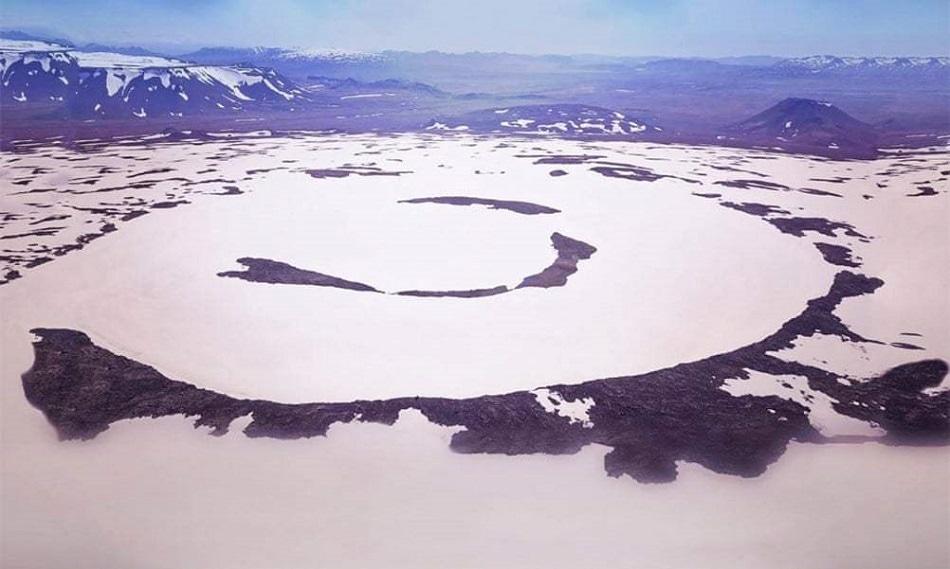
The Former Okjӧkull Glacier. Image Credit: Rice University
We know what is happening and know what needs to be done. Only you know if we did it.
This line concludes the somber inscription on the memorial plaque laid at the site of a monument unveiled in Borgarfjörður, Iceland, to memorialize Okjökull, known as Ok for short.
Titled, “A letter to the future” the plaque reveals, “Ok is the first Icelandic glacier to lose its status as a glacier.” This revelation leaves us with the lasting impression that things are far from ok in terms of the forecasted global impact the looming climate disaster holds in store for the future of the planet.
Furthermore, with recent temperatures soaring above freezing in Greenland leading to 12.5 billion tonnes of ice melting in one day – enough to cover the entire land-mass of Germany in almost 7cm (2.75 inches) of water – we will discover within the next decade as to whether humanity has done enough to prevent catastrophe.
In recent years scholars and scientists have latched onto the term for the current geological epoch the “Anthropocene” which was first coined in 2000 by Nobel Laureate Paul Crutzen, and later addressed by Eugene F. Stoermer, in IGBP’s Global Change newsletter 41. Initially, it was the geologists usually responsible for defining these terms, that struggled to accept this new claim believing it absurd that all of a sudden a relatively young species such as humanity was now “genuine geological force.”
Yet, now unable to ignore human impact on the acceleration of the melting ice in Greenland and Iceland alike, geologists have come to predict a bleak series of consequences in store for humanity and the planet. These include; displacing up to a fifth of the global population leading to a surge of climate refugees that under current international laws would not be granted asylum by industrialized countries; land masses disappearing altogether, including the Marshall Islands, the Maldives and Tuvalu.
In fact, already the Marshall Islands has seen a proportional migration of its population migrate to rural Arkansas. Leading to not just geographical displacement but also risking the loss of cultural heritage for this community; damage to the world’s economy as 90 percent of trade is carried by sea, rising sea levels would cause devastation to the infrastructure of ports worldwide creating a domino effect that would severely impact peoples access to food, water, and energy.
Furthermore, there are risks to public health as rising sea levels would cause more flooding and damaging sewage and water treatment plants which would mean increased pollution to sources of water which helps spread diseases.
Iceland commemorates first glacier that 'died' by climate change
In order to circumvent the very worst repercussions of climate change, scientists have warned we must limit global temperature rise to 1.5ºC. Compared with the temperatures of the 1800s, before widespread industrialization, the planet has already warmed about 1ºC. If temperature rises continue to spiral upwards at today's rate, they may rise by between 3 to 5ºC by the end of the century. This is beyond the realm of catastrophe and into that of apocalypse.
The United Nations assembled a climate panel that produced a major report back in 2013 predicting that by the end of this century current sea levels would rise between 52-98 cm (20.4 inches to 38.5 inches). Yet, many scientists saw those estimations as understated and the models used to determine these figures did not take into consideration all eventualities.
Given the current trends and warning signs we see and experience, from the rapid disappearance of the carbon-rich permafrost to the extreme weather conditions around the world, the scientists wary of the aforementioned UN reports may have had every right to be skeptical. Prof. Cymene Howe of Rice, told the UK Guardian last month that the plaque, “would be the first to a glacier lost to climate change anywhere in the world.” She said that an Icelandic colleague told her, “Memorials are not for the dead; they are for the living.”
So, with humanity possibly facing its largest challenge to date, solutions are required to prevent further losses of the massive white sheets of ice that work to reflect rays from the sun back into the environment, keeping temperatures mild. With agreements and actions on climate change such as the UN’s Paris Agreement progress is an ongoing process.
Only future generations will, “know if we did it.”
Disclaimer: The views expressed here are those of the author expressed in their private capacity and do not necessarily represent the views of AZoM.com Limited T/A AZoNetwork the owner and operator of this website. This disclaimer forms part of the Terms and conditions of use of this website.